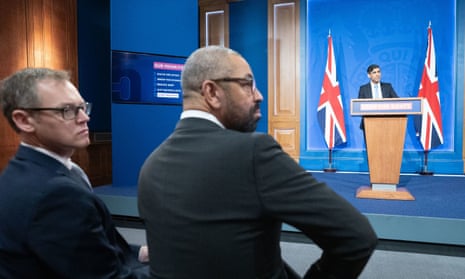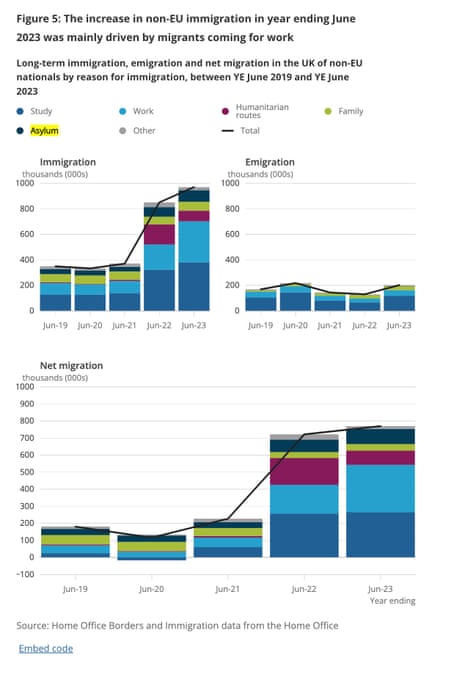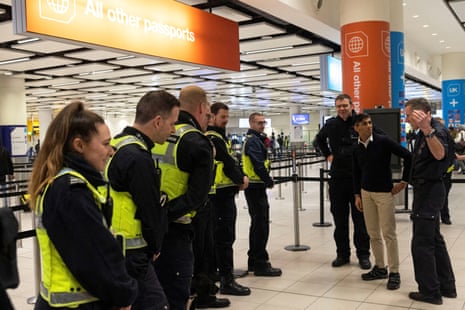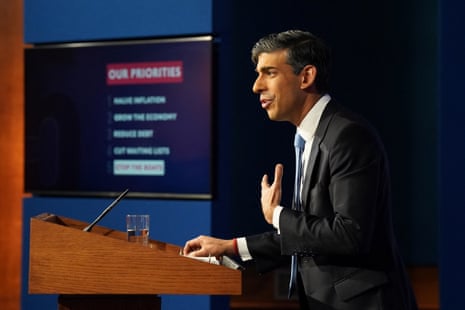Sunak rehearses his general election messaging – summary and analysis of his Downing Street press conference
Rishi Sunak gave his press conference in No 10, and he was ostensibly talking about government policy, but in reality that was a party political event, where Sunak was rehearsing messages we are likely to hear endlessly as the year goes on. Politicians often sound boring when they just say the same thing over and over again, but message discipline is vital in campaigns, and Sunak can’t be faulted in this respect. His problem is not failing to get the message across; it’s what the message actually says.
Here are the main points.
The Conservative party last night demonstrated that they are completely united in wanting to stop the boats. This bill passed with an overwhelming majority in parliament …
The Conservative party is completely united in wanting to deliver for the country, cut their taxes and, crucially, to stop the boats.
While it is true that almost all Tory MPs support the Rwanda policy in principle (agreement on ends), given there is so much disagreement about means, using the phrase “completely united’ is probably pushing spin too far. Most voters watching events in parliament this week will have concluded that the party is not united.
It’s now time for the Lords to pass this bill. This is an urgent national priority.
The treaty with Rwanda is signed and the legislation which deems Rwanda a safe country has been passed unamended in our elected chamber.
There is now only one question. Will the opposition in the appointed House of Lords try and frustrate the will of the people as expressed by the elected house? Or will they get on board and do the right thing?
This is similar to what Theresa May said about the Lords when she justified calling a general election in 2017, and what Boris Johnson said about parliament in general when he pushed for an election in 2019. History suggests that peers will take no notice, and that they will insist on scrutinising the bill with their usual thoroughness. The claim that the bill is the “will of the people” is also Johnsonite populism. Assessing public opinion about the Rwanda plan is complicated, because results vary a lot depending on how the question is framed, but it is not clear the policy does have majority support. Only yesterday YouGov published polling saying 40% of people agree with Labour’s plan to abandon the policy.
-
Sunak said that he wanted the first plane to Rwanda to leave “as soon as practically possible” – but he refused to give a target date. (See 10.35am.) In November last year he said he hoped the first flights would leave by the spring but, when asked if that was still his expectation, he dodged the question.
-
Sunak did not give a firm commitment to ignore injunctions from the European court of human rights (rule 39 orders) blocking deportation flights in all circumstances. Asked about this, he just repeated what he said on Monday, when he said he would be willing to ignore those in some circumstances. “There will always be individual circumstances where people rightly would expect us to examine the facts,” he said.
This is an election year and the choice of that election is going to be clear.
We have got a plan. That plan is working if we stick with it, we can deliver a brighter future for the country. Renewed pride in our country. And the alternative is that we go back to square one because he (Keir Starmer) can’t tell you what he’s going to do because he doesn’t have a plan.
This has echoes of David Cameron campaigning in 2015 on the basis that the Conservatives had a “long-term economic plan”. The slogan worked, in that it conveyed a sense of purpose, even though no one could actually say what the plan was. Sunak is trying to pull off something similar, but it is a very hard ask, because public sector delivery in so many areas has been so dismal in recent years
-
Sunak repeatedly claimed Labour would take the UK “back to square one”. He used the phrase eight times. In the past I’ve argued that this a poor campaigning message, because many people would regard square one as an improvement, but James Johnson, a pollster who used to work with No 10, says this goes down well with voters who switched from the Tories to Labour. In a post on X last week reporting the results of a focus group, he said:
Keir Starmer seen as “weak”, “spineless”, “unchallenging”, “boring” and – above all else – as having “no plan”. They are voting Labour *despite* Keir Starmer rather than because of him. Lack of plan/square one attack by Sunak was the only clip that went down well
NEW 🇬🇧 Conservative-to-Labour switchers @jlpartnerspolls @timesradio focus group. Key points:
💥 These switchers have left the Tories “for good”, furious at lack of delivery of promises in 14 years of govt
💥 Rishi Sunak has gone from a breath of fresh air a year ago to…
— James Johnson (@jamesjohnson252) January 11, 2024
Keir Starmer once again can’t tell anybody how he plans to pay for this £28bn green spending spree. Can’t tell anyone. So what does that mean? That means everyone’s taxes are going to go up.
The Tories have been making this claim for ages now – it is the most frequently used attack line in the anti-Labour material sent out by CCHQ – but “green spending spree” is new, and this is the most succinct version of this message. Starmer has explicitly said that he won’t put up taxes to fund the green investment plan, and that if it cannot be done within Labour’s fiscal rules, it won’t happen. But the Tories still won’t let go.
Key events
Afternoon summary

More than half of Britons wrongly think illegal migration as high or higher than legal migration, poll suggests
The number of people who arrive in the UK illegally is far smaller than the number who arrive legally.
In the year ending September 2023 there were 45,081 illegal arrrivals, according to this Home Office report (which describes them as irregular arrivals).
According to the latest ONS figures, the total number of immigrants coming to the UK in the year ending June 2023 was 1.2m.
Allowing for the 508,000 people who emigrated, net migration was 672,000 in the year ending June 2023.
These figures include people who arrive illegally and claim asylum, but they are only a small proportion of the overall total. As this chart shows, most people coming to the UK either have a study or work visa, or are a dependant of someone who does.

Yet, according to polling from YouGov, voters are more likely to think (wrongly) that more people come to the UK illegally than legally than to think (rightly) that more people arrive legally. In fact, more than half of Britons wrongly think illegal migration is as higher or higher than legal migration.
People who voted Conservative in 2019 are more likely to be wrong than people who voted Labour.
And only 23% of all voters, and 16% of people who voted Tory in 2019, correctly realised that many more people come to the UK legally than illegally, the poll suggests.
Do Britons believe more migrants come to the UK legally or illegally?
All Britons
More come illegally: 45%
More come legally: 34%
About the same: 8%
2019 Con voters
More come illegally: 56%
More come legally: 27%
About the same: 8%
2019 Lab voters
More come illegally: 33%
More come legally: 44%
About the same: 7%
Do Britons believe more migrants come to the UK legally or illegally?
All Britons
More come illegally: 45%
More come legally: 34%
About the same: 8%2019 Con voters
More come illegally: 56%
More come legally: 27%
About the same: 8%2019 Lab voters
More come illegally: 33%
More… pic.twitter.com/KJfjt0lL1o— YouGov (@YouGov) January 18, 2024
These figures go a long way to explain why the Rwanda bill has become such a priority for Rishi Sunak.
The Green party says the House of Lords should defy convention, which says its job is to amend bills passed by the Commons, not block them (see 2.41pm), and throw out the Rwanda bill. This is from Jenny Jones, one of the two Green party peers.
We really need to stop this appalling bill, it is not a manifesto commitment and convention allows the Lords to reject it. If the prime minister wants to claim the Rwanda bill is the will of the people then please hold a general election.



Low general election turnout likely with ‘dull as dishwater’ Sunak and Starmer
The polling expert Prof John Curtice has warned of low turnout at this year’s general election, in part because voters regard Rishi Sunak and Keir Starmer to be as “dull as dishwater”, Matthew Weaver reports.
Cameron dismisses Nadine Dorries’ claim he is being lined up to be next Tory leader
David Cameron has dismissed a claim from Nadine Dorries, the former culture secretary, that he is being lined up to be the next Conservative party leader.
Two days ago Dorries posted a message on X saying:
I’m calling it now.
The plan is to install David Cameron as next leader of the party following defeat in the GE.
I’m calling it now.
The plan is to install David Cameron as next leader of the party following defeat in the GE.THE PLOT https://t.co/sSFbD1uulu
— Rt Hon Nadine Dorries (@NadineDorries) January 16, 2024
This was not written approvingly; she was critical of him when he was PM, and she became a very strong Boris Johnson supporter partly because she felt Johnson was not condescending towards her in the way she thought Cameron was.
In an interview with Times Radio, asked about Dorries’ prediction, Cameron replied:
Well, she’s always been a much better novelist than a political forecaster. I think I’ll leave it at that.
In the interview the former prime minister was also asked if he minded playing “second fiddle” to Rishi Sunak. He replied:
No, not at all actually, because he’s a very clear boss.
He’s easy to work for because he knows what he wants. He chairs cabinet meetings with great efficiency. He’s read everything, understood everything. He knows what the issues that are contentious, that we have to discuss, are about. And he has a pretty clear view of what he wants, so that’s a good boss.

Labour says Sunak ‘not fit for public office’ because of his record of ‘playing fast and loose with facts’
Labour says the rebuke issued to Rishi Sunak today by the UK Statistics Authority over a misleading tweet about the asylum backlog (see 12.21pm) shows he is not fit for office. This is from Stephen Kinnock, the shadow immigration minister, who is one of the MPs who complained to the body about Sunak’s post on X. Kinnock said:
Labour wrote to the UK Statistics Authority a year ago to complain about Rishi Sunak repeatedly lying about the asylum backlog, and he was warned not to do it again.
Yet once again he has been caught red-handed. The prime minister’s addiction to playing fast and loose with the facts is the behaviour of someone not fit for public office.
He has not cleared the backlog – there are 100,000 people still awaiting a decision. He should adopt Labour’s backlog clearance plan, and deliver the security partnership we need to stop the boats getting in the water in the first place.
What will happen to Rwanda bill when it reaches Lords?
A reader asks:
Are there any potential amendments that the Lords could add that Labour and other opposition parties may support? I.e. some kind of amendment that would wreck the bill as imagined by #10? At the mo I assume Labour will vote against the bill itself so out of principle would not vote for any amendments either as that would be seen as flip-flopping. However, something that could gather support of 30 or so centrist Tory MPs and the opposition may cause Sunak all sort of headaches and potentially trigger a snap GE?
You would be wrong to assume that Labour will try to vote down the bill in the House of Lords. In the Lords, peers almost never vote on bills at second reading (which in the Commons is the main yes/no moment for deciding if a bill goes ahead). They mainly vote on amendments to the bill. Peers don’t think they have the constitutional authority to just vote down bills passed by the Commons.
But it is not hard to imagine amendments that would get the support of opposition parties, many crossbenchers and some Conservatives. Just look at the amendments to the bill in the Commons tabled by Yvette Cooper and Stephen Kinnock (for example, calling for the creation of a monitoring committee to review the Rwanda treaty, and to make sure Rwanda is complying) or amendments tabled by Tory centrists such as Robert Buckland and Jeremy Wright (eg, saying the Home Office has to be sure Rwanda is complying with the treaty before it starts deportations, or ensuring the UK cannot decide for itself if it is in compliance with international law). The amendments are here.
Some amendments – these ones, or ones like them – will almost certainly be passed in the Lords. And, when the bill goes into ping-pong between the Lords and the Commons, peers will choose to fight hardest on a handful with most support.
But if the government holds firm, it is more likely than not that the Lords will eventually pass its version of the bill.
Given that Tory centrists did not rebel when the bill was in the Commons, I don’t think they are likely to do so when it returns from the Lords. And so I don’t think there is much chance of it generating the sort of crisis that would lead to an early election.
A reader asks:
In reference to the Rwanda bill – was the bill in the Conservative manifesto and, if not, could the House of Lords delay passing the bill for 12 months? Would the delay take the bill past the last date for the general election ?
The bill was not in the manifesto, and the Lords, in theory, could delay it, or block it altogether, but they won’t. Labour and the Lib Dems believe that would help Rishi Sunak make the argument the opposition parties are blocking the bill. But that’s not the main reason why they won’t. They will pass the bill, with amendments, because peers don’t think they have the democratic authority to block the Commons. They can just revise, and invite the government to “think again”.
According to Henry Zeffman from the Times, a timetable for the bill has already been agreed.
When will the Lords debate Rwanda?
Understand much of the timetable has already been agreed
2nd reading Jan 29
Committee stage February 12/14/19
Report probably March 4, 3rd reading March 12
So MPs will be looking at (ie trying to remove) Lords amendments by about March 18
When will the Lords debate Rwanda?
Understand much of the timetable has already been agreed
2nd reading Jan 29
Committee stage February 12/14/19
Report probably March 4, 3rd reading March 12
So MPs will be looking at (ie trying to remove) Lords amendments by about March 18
— Henry Zeffman (@hzeffman) January 18, 2024
Almost 6,000 asylum seekers who withdrew claims cannot be located, Home Office admits

Rajeev Syal
Almost 6,000 asylum seekers who withdrew their claims cannot be located by the Home Office, ministers have admitted.
The immigration ministers Michael Tomlinson and Tom Pursglove wrote in a joint letter that 5,598 claimants withdrew their claims and are being sought by officials.
In correspondence with Diana Johnson, the chair of the home affairs committee, the ministers wrote that officials had updated their files on 17,316 asylum seekers whose claims had been withdrawn in the year to September 2023. They said:
5,598 (32%) remain in the UK and the Home Office is taking steps to urgently re-establish contact with them.
Where we obtain up-to-date contact details for a person from our tracing checks, we will then consider the most appropriate intervention, including whether to task an enforcement team to go and arrest them.
Yvette Cooper, the shadow home secretary, claimed this was further evidence that the asylum system was in chaos. She said:
This is a staggering admission that the Home Office has lost almost 6,000 asylum seekers and has no idea where they are. The fact that thousands of people have been allowed to effectively disappear into the underground economy or left vulnerable to exploitation by criminal gangs is yet more evidence of the shocking mismanagement and chaos in the Tory asylum system.
Time and again ministers are spending their time on gimmicks rather than getting a grip. Labour will establish a major new returns and enforcement unit to properly track cases, take swift enforcement action and make sure those with no right to be in the country can be quickly removed.

This is from Alistair Carmichael, the Lib Dem home affairs spokesperson, commenting on the UK Statistics Authority’s reply to his complaint about Rishi Sunak’s misleading tweet about the asylum claims backlog. (See 12.21pm.)
Not only is the Conservative government celebrating something that is no achievement, they are twisting the facts – as proven by the UK Statistics Authority just today.
As this letter again shows, the Conservatives have not cleared the asylum backlog. Thousands of vulnerable people are still living in limbo as they wait for their claims to be processed. The British public deserves better than this.
MPs approve order to ban Hizb ut-Tahrir
MPs have backed plans to ban the Islamist political group Hizb ut-Tahrir as a terrorist organisation, PA Media reports. PA says:
Hizb ut-Tahrir has organised rallies which took place on the streets of London alongside pro-Palestine marches in recent months, following the outbreak of the Israel-Hamas conflict.
It has already been banned in Germany, as well as in several Arab and Asian countries because of what the Home Office has described as its “long-term goal of establishing a caliphate ruled under Islamic law”.
With headquarters in Lebanon, the group also operates in at least 32 countries including the UK, United States, Canada and Australia.
The Commons approved plans to proscribe the group as a terror organisation today, and the House of Lords is expected to follow suit.
The ban will mean belonging to, inviting support for and displaying symbols of the group in public will be a criminal offence.
In the Commons, security minister Tom Tugendhat said the proscription order would cover the entire global organisation, as well as all regional branches including Hizb ut-Tahrir Britain.
He claimed the group engaged in “homophobic and antisemitic discourse”, that it “plays the mood music to which other terrorists dance”, and had glorified Hamas’s attacks on Israeli citizens on 7 October .
Tugendhat told MPs: “This proscription will serve as a reminder that the United Kingdom does not and will never tolerate the promotion of or encouragement of terrorism. It will send the message that promoting or encouraging Hamas’ sickening attack on October 7 is utterly unacceptable and at odds with the values of this country.”
MPs have been told that the government will publish its plans for full compensation for victims of the infected blood scandal by the summer.
Yesterday Sir Brian Langstaff, chair of the inquiry into the scandal, said that the inquiry will publish its final report on 20 May.
In the Commons today John Glen, the Cabinet Office minister, said the the government was “committed to updating parliament on next steps within 25 sitting days of (the report’s publication)”.
The government has been criticised not finalising details of its compensation package ahead of the report’s publication. Yesterday Langstaff said:
The inquiry’s final recommendations on compensation were published in April 2023. My principal recommendation remains that a compensation scheme should be set up with urgency. No-one should be in any doubt about the serious nature of the failings over more than six decades that have led to catastrophic loss of life and compounded suffering.
During business questions in the Commons today, Penny Mordaunt, the leader of the Commons, said she did not disagree with an MP who complained about the wait for the details of the full compensation package. “This house has also been clear in its desire to see this appalling scandal resolved quickly,” she said.
MPs call for public information campaign so parents know when mildly ill children should go to school

Sally Weale
Senior Conservative MPs have urged the government to launch a national public information campaign to help drive up pupil attendance in England’s schools and reduce pressure on GPs.
They say parents need advice on when it is appropriate to send their children to school with a mild illness, and when to “administer self-care” rather than going to their GP. An estimated 1.5m pupils missed 10% or more of scheduled classes in autumn and spring last year.
Robin Walker, the chair of the Commons education committee, and Steve Brine, who chairs the health and social care committee, have written to the education and health secretaries outlining their proposal. The letter says:
We are writing to recommend a joint public information campaign between the Department of Health and Social Care (DHSC) and the Department for Education (DfE) to help pupils and parents make more informed decisions about attending school with a minor illness, and about appropriate situations in which to seek care from a GP.
The education committee has previously published a report on persistent absence. It found that illness is the primary cause, and it is significantly higher than before Covid owing to a shift in parental attitudes to sending their children to school with minor illnesses.
The Department for Education did address this issue last year in a letter it distributed to headteachers. The letter, signed by Prof Sir Chris Whitty, the chief medical for England, and other health leaders, said:
There is wide agreement among health professionals and educational professionals that school attendance is vital to the life chances of children and young people. Being in school improves health, wellbeing and socialisation throughout the life course. The greatest benefits come from children and young people attending school regularly.
It is usually appropriate for parents and carers to send their children to school with mild respiratory illnesses. This would include general cold symptoms: a minor cough, runny nose or sore throat. However, children should not be sent to school if they have a temperature of 38°C or above. We would encourage you to share the NHS ‘Is my child too ill for school?’ guidance with parents and carers in your schools and communities which has further information.

Libby Brooks
Humza Yousaf was challenged over the Post Office Horizon scandal at first minister’s questions. The Scottish Conservative leader, Douglas Ross, pressed him on an apparent mismatch between his preference for mass exoneration of Post Office scandal victims and the caution exhibited by the lord advocate, Dorothy Bain, earlier this week, when she insisted that not all convictions based on Horizon evidence might be unsound.
In contrast to the rest of the UK, it was the Crown Office that prosecuted Horizon cases in Scotland rather than the Post Office itself, and Bain apologised to victims in her role as the head of Scottish prosecutors on Tuesday.
Yousaf said it was still his preference to have legislation exonerating victims to be applied on a UK-wide basis through a legislative consent motion, and it’s clear that – like his UK counterparts – he favours expediency.
But because of the different position of the Crown Office as prosecutors of the cases in Scotland, there does remain a tension here; many MSPs working with wrongly accused constituents are asking why the Crown Office hasn’t been more proactive in encouraging those who may have been affected to come forward.
Bain noted on Tuesday that “not every case in which Horizon evidence is present will represent a miscarriage of justice”, pointing out that of 73 individuals written to by the Scottish Criminal Cases Review Commission only 16 people had come forward to identify themselves as possibly affected.
She also acknowledged that some of those who did not come forward may simply be too exhausted or traumatised by their experience to want to re-engage, but this raises the question of what can be done to ease their experience going forward.
Sunak reprimanded by UK’s statistics watchdog over misleading claim about asylum claims backlog being cleared
Rishi Sunak and the Home Office have been reprimanded by the UK’s statistics watchdog over a misleading claim about the asylum claims backlog being cleared.
On 2 January the Home Office announced it had cleared the “legacy” backlog of asylum claims (defined as those submitted before June 2022, when the Nationality and Borders Act came into force). This was criticised as misleading because, as the Home Office admitted, 4,500 particularly complex cases had not been cleared. But Sunak went further later in the day when he posted a message on X implying the whole of the backlog had been cleared. Labour said that was a “barefaced lie”.
Although the legacy backlog has been cleared, with the exception of 4,500 complex cases, there are still almost 100,000 cases in the overall asylum claims backlog.
In response to complaints about this from Alistair Carmichael, the Lib Dems’ home affairs spokesperson, and Stephen Kinnock, the shadow immigration minister, Sir Robert Chote, the chair of the UK Statistics Authority, released an open letter to them saying people may have been misled and that the claims from the PM and the Home Office may have undermined trust in the government. Chote said:
The average member of the public is likely to interpret a claim to have ‘cleared a backlog’ (what Sunak said in his post on X) – especially when presented without context on social media – as meaning that it has been eliminated entirely, so it is not surprising that the government’s claim has been greeted with scepticism and that some people may feel misled when these ‘hard cases’ remain in the official estimates of the legacy backlog. That said, there may be a perfectly good case for excluding cases of this type from any commitment to eliminate the backlog over the timeframe the government chose, but this argument was not made at the time the target was announced or when it was clarified in the letter to the home affairs committee.
This episode may affect public trust when the government sets targets and announces whether they have been met in the other policy domains. It highlights the need for ministers and advisers to think carefully about how a reasonable person would interpret a quantitative claim of the sort and to consult the statistical professionals in their department.
Sunak rehearses his general election messaging – summary and analysis of his Downing Street press conference
Rishi Sunak gave his press conference in No 10, and he was ostensibly talking about government policy, but in reality that was a party political event, where Sunak was rehearsing messages we are likely to hear endlessly as the year goes on. Politicians often sound boring when they just say the same thing over and over again, but message discipline is vital in campaigns, and Sunak can’t be faulted in this respect. His problem is not failing to get the message across; it’s what the message actually says.
Here are the main points.
The Conservative party last night demonstrated that they are completely united in wanting to stop the boats. This bill passed with an overwhelming majority in parliament …
The Conservative party is completely united in wanting to deliver for the country, cut their taxes and, crucially, to stop the boats.
While it is true that almost all Tory MPs support the Rwanda policy in principle (agreement on ends), given there is so much disagreement about means, using the phrase “completely united’ is probably pushing spin too far. Most voters watching events in parliament this week will have concluded that the party is not united.
It’s now time for the Lords to pass this bill. This is an urgent national priority.
The treaty with Rwanda is signed and the legislation which deems Rwanda a safe country has been passed unamended in our elected chamber.
There is now only one question. Will the opposition in the appointed House of Lords try and frustrate the will of the people as expressed by the elected house? Or will they get on board and do the right thing?
This is similar to what Theresa May said about the Lords when she justified calling a general election in 2017, and what Boris Johnson said about parliament in general when he pushed for an election in 2019. History suggests that peers will take no notice, and that they will insist on scrutinising the bill with their usual thoroughness. The claim that the bill is the “will of the people” is also Johnsonite populism. Assessing public opinion about the Rwanda plan is complicated, because results vary a lot depending on how the question is framed, but it is not clear the policy does have majority support. Only yesterday YouGov published polling saying 40% of people agree with Labour’s plan to abandon the policy.
-
Sunak said that he wanted the first plane to Rwanda to leave “as soon as practically possible” – but he refused to give a target date. (See 10.35am.) In November last year he said he hoped the first flights would leave by the spring but, when asked if that was still his expectation, he dodged the question.
-
Sunak did not give a firm commitment to ignore injunctions from the European court of human rights (rule 39 orders) blocking deportation flights in all circumstances. Asked about this, he just repeated what he said on Monday, when he said he would be willing to ignore those in some circumstances. “There will always be individual circumstances where people rightly would expect us to examine the facts,” he said.
This is an election year and the choice of that election is going to be clear.
We have got a plan. That plan is working if we stick with it, we can deliver a brighter future for the country. Renewed pride in our country. And the alternative is that we go back to square one because he (Keir Starmer) can’t tell you what he’s going to do because he doesn’t have a plan.
This has echoes of David Cameron campaigning in 2015 on the basis that the Conservatives had a “long-term economic plan”. The slogan worked, in that it conveyed a sense of purpose, even though no one could actually say what the plan was. Sunak is trying to pull off something similar, but it is a very hard ask, because public sector delivery in so many areas has been so dismal in recent years
-
Sunak repeatedly claimed Labour would take the UK “back to square one”. He used the phrase eight times. In the past I’ve argued that this a poor campaigning message, because many people would regard square one as an improvement, but James Johnson, a pollster who used to work with No 10, says this goes down well with voters who switched from the Tories to Labour. In a post on X last week reporting the results of a focus group, he said:
Keir Starmer seen as “weak”, “spineless”, “unchallenging”, “boring” and – above all else – as having “no plan”. They are voting Labour *despite* Keir Starmer rather than because of him. Lack of plan/square one attack by Sunak was the only clip that went down well
NEW 🇬🇧 Conservative-to-Labour switchers @jlpartnerspolls @timesradio focus group. Key points:
💥 These switchers have left the Tories “for good”, furious at lack of delivery of promises in 14 years of govt
💥 Rishi Sunak has gone from a breath of fresh air a year ago to…
— James Johnson (@jamesjohnson252) January 11, 2024
Keir Starmer once again can’t tell anybody how he plans to pay for this £28bn green spending spree. Can’t tell anyone. So what does that mean? That means everyone’s taxes are going to go up.
The Tories have been making this claim for ages now – it is the most frequently used attack line in the anti-Labour material sent out by CCHQ – but “green spending spree” is new, and this is the most succinct version of this message. Starmer has explicitly said that he won’t put up taxes to fund the green investment plan, and that if it cannot be done within Labour’s fiscal rules, it won’t happen. But the Tories still won’t let go.



